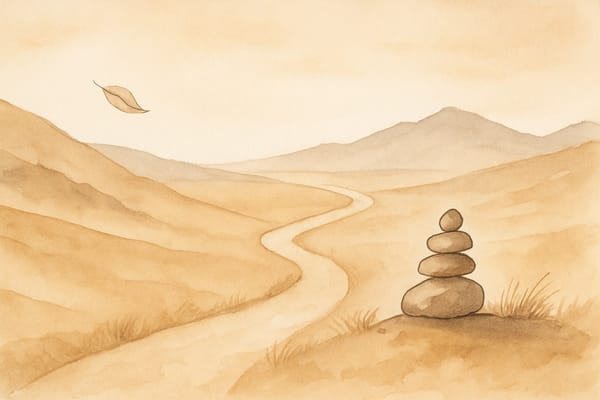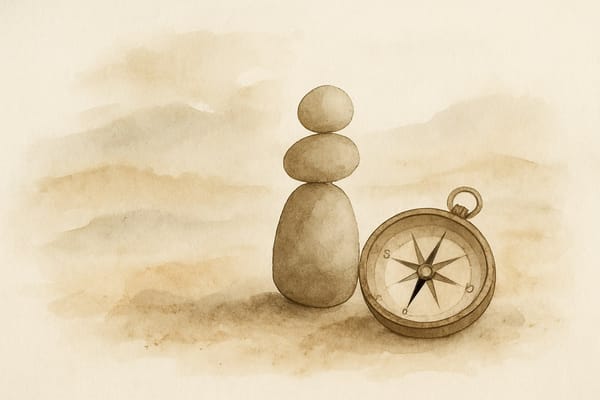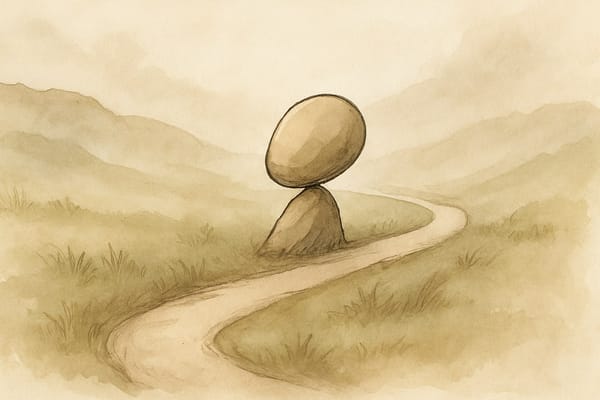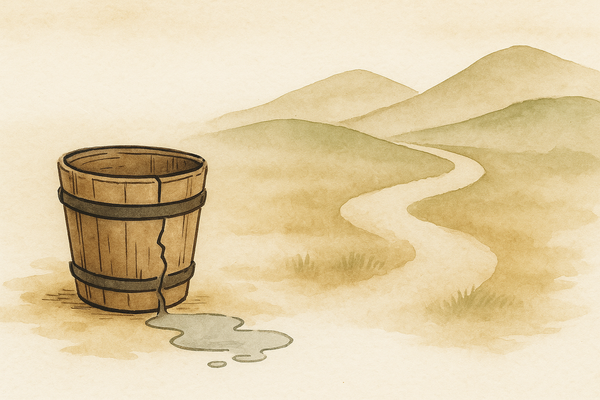W3. Tranquility over Virtue?
What happens when you swap virtue for tranquility as the highest goal in life? In this post, I explore the tensions between William Irvine’s modern take on Stoicism and traditional virtue ethics, and what that means in real-life decisions.
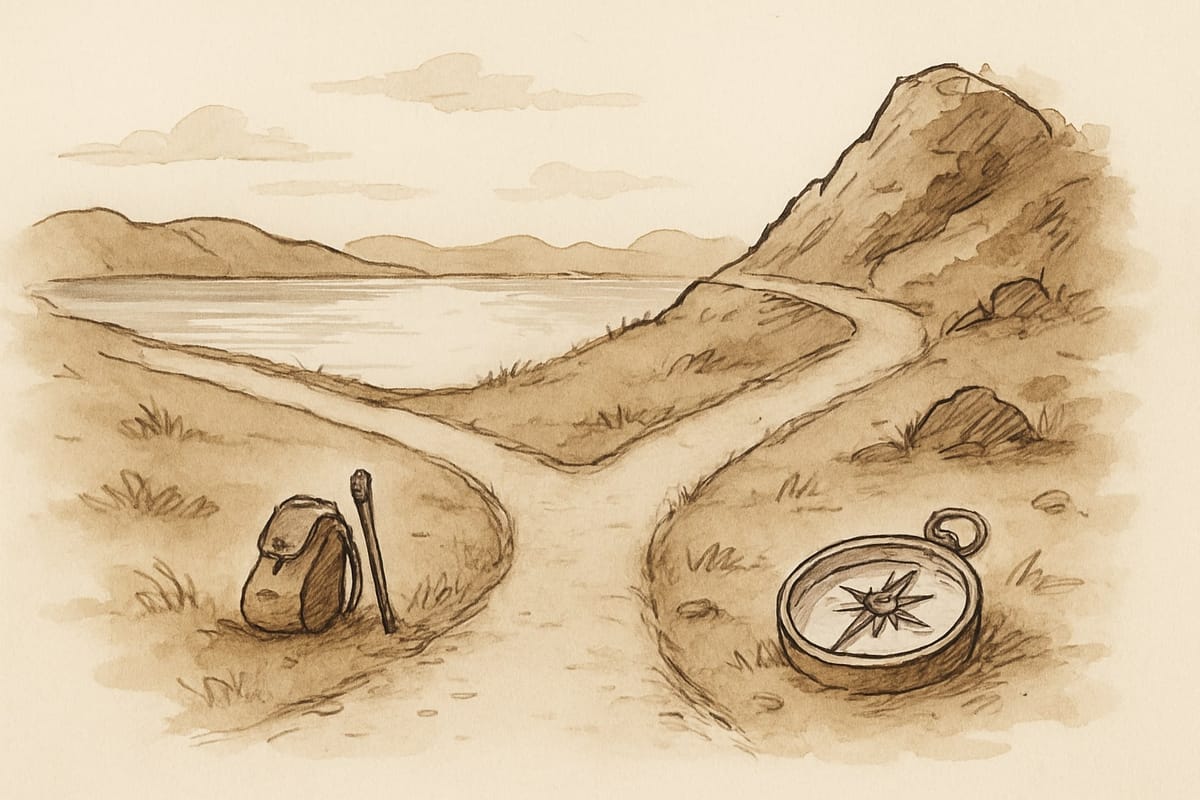
It’s such a strange thing to me how William Irvine (one of the most popular authors on Stoicism, known mostly for his book A Guide to the Good Life) extracts ataraxia (tranquillity) as the main goal of stoicism.
No sources back this up. At the same time he has no qualms about changing stoicism into his own philosophy.
It’s starting to make sense, why focus on virtue as the highest good when doing so was mainly reasonable from a more religious and metaphysical perspective?
I understand Donald Robertsons position, virtue can never be abused, always does good and is the only thing we can control.
But what if it doesn’t make you feel good? Is that still a life well lived?
Humans appear to need the marriage of reason and emotions—Stoics focus on the first and most people on the latter.
Most of our common ailments today seem to be psychological. It makes sense that there would be a need to combat that the way William does.
He doesn’t focus on virtue for virtue’s sake, but rather as a tool towards tranquillity—the absence of negative emotions.
And he’s not avoidant, he believes virtue will get you towards tranquillity and one should become resilient to possess it fully first.
This makes sense to me. Life is inherently psychological and we need to deal with that firstly.
I don’t think the problem is the philosophy at all, but rather that William calls it Stoicism when he probably should call it Stoicism-inspired.
I want a good life, the best possible during this lifetime. Tranquillity is a good goal, especially when predicated on virtue.
So far I’m seeing less tensions compared to traditional Stoicism and potentially more joy and peace in this approach.
Confusion
Reading this journey will be an exercise in moderation no doubt!
While I’ve been playing with William's version of Stoicism and putting ataraxia (tranquillity) as the highest good and virtue as the means of getting there, there have been consequences.
Yes, using negative visualization to realize how good life is now instead of as a preparation for future issues to be met with virtue, has been enjoyable.
And invoking imaginary stoic gods to test me on my stoicism has been fun.
But the main problem I find is that it doesn’t properly guide me on what the next course of action should be—one of the major benefits of having a philosophy of life.
When tranquillity is the goal of life there’s always the question of:
Should I do the virtuous thing that might lead to tranquillity? Or just let it go to get tranquillity now?
On big topics this is a non-issue because letting it go will eat on your conscience and disturb your tranquillity.
But on smaller everyday tasks (like should I do the laundry now? The dishes? Should I prep before our visitors come in a few days?)
These things I can let go without any problem and gain a sense of tranquillity right away.
But the virtuous thing to do—is to get it done now, otherwise it lands on my partner or the visitors don’t have as good of a time here due to bad prepping.
When virtue is the highest good you always know what to do because there are no lofty goals that’s emotionally based that may or may not happen.
It removes confusion.
More Confusion
Confusion is like a disease that just won’t loosen its grip over me.
Sometimes I think William’s path is the only one that makes sense.
We’re all looking to live the best possible life right?
Virtue for virtue’s own sake can be a hard pill to swallow, yet—when I think of the self-centeredness of ataraxia—I can’t help but wonder if it’s less fulfilling than classical Stoicism.
At the end of my life what will have made the most sense—to have lived as peacefully as possible—or as virtuously as possible?
Perhaps what I really need is more premeditatio malorum—to contemplate setbacks like these and learn to handle them virtuously.
A Morning Misspent
So here’s the minor and obvious error.
Today I spent the morning (as have become a habit) researching the pros and cons of William Irvine’s Ataraxia Stoicism and the true-to-the-original Stoicism of Donald Robertson.
As well as virtue ethics vs consequence ethics.
Wouldn’t it have been a better morning spent preparing for this evening’s barbeque?
To research the things I need to get done today?
And of course the best part is, that would have been the virtuous thing to do.
So here’s what I’m thinking…
Maybe I should start my day with premeditatio malorum, journal, and then do the things that need to be done.
Simple and makes sense right?
Difficulty with Virtue
Despite my twisting and bending, there’s just something inherently wrong (or at least very difficult) about treating virtue as something autotelic (an end in itself).
When looking at its history, that there’s a benign immanent force that we’re all a part of—it makes sense to treat virtue as an end in itself as it’s the highest human expression and will of god (still an immanent and not a theistic one).
For us secular stoics we have to do some mental gymnastics to keep virtue as the highest and only good but to my understanding it can be summarized as:
Virtue is the only thing fully within our control (can’t be abused), and can both feel and be good (though only the latter matters), hence we should focus on it and learn to take pleasure from it.
A well formulated and solid argument.
The problem to me is how it requires a certain understanding and leap of faith compared to William's version–where such a leap of faith is not needed.
When the main goal becomes tranquillity, or rather minimizing the amount of negative emotions while enjoying positive ones—the reason is obvious in itself.
Avoiding feeling bad and enjoying feeling good requires no explanation.
So how do we do this without becoming pleasure-seeking hedonists?
According to William, living virtuously is the one main method of achieving it.
Isn’t that interesting?
There’s a lot more to be said about their differences—and much more likely will be said if I continue to explore this path and see where it leads me.
One of the interesting questions becomes:
If you change the main goal of a philosophy—virtue to tranquillity—is it still the same philosophy?
I’m not sure to be honest, probably not.
But the goal in my opinion is how to live the best possible life—the philosophy is only instrumental to that purpose.
Self-Centeredness
Today I had an enlightening experience that really puts the spotlight on the different ways the philosophies behave.
It requires a bit of context first.
I was meant to go running with a friend of mine, she had a concert the day before therefore wasn't sure if she'd be able to wake up early to join the run at 9 AM.
As I didn't hear from her in the morning I figured she'd sleep in, so I took a bit longer to get ready than I had originally planned.
It was a long run, 24km in the scorching Cyprus sun, 30 degrees celsius.
Well to my surprise, she had woken up and just leapt out of the bed and went straight out just after 9.
So when out running, I meet her on the path but because I've now taken longer to warm-up and get started–and she is closer to the originally planned time–we're unsynced.
So at that point I ask her if she still has energy to join me going further (a big ask to someone who's never ran more than 11km before) and she doesn't, so we split ways.
A few kms later I realize–I could just have ran in the same direction as her and then circled a few pathways to add my extra kms from changing my running path.
The problem in this encounter, was that I put my own needs and my own tranquility first and foremost.
It was easier for me to stay on my own path and finish the run just as I had planned it, rather than change it to accommodate someone else.
But when I realized the sacrifices she made so we could have a run together and how uncompromising I was myself–I spent the rest of the run suffering from making such a bad decision.
You can certainly make the argument here that in Irvine's version, virtue is still the tool for tranquility and that's true.
But the problem was that I kept tranquility in my mind first and foremost, a self-centered approach, and by default put my current needs ahead.
This was a big insight for me, it exposed the crack of confusion–and the potential inconsistency–that exchanging virtue for tranquility can bring.
When virtue is the highest good, it's expressed through your actions, not how you feel.
Perhaps this was the reminder I needed to set me back on track.


